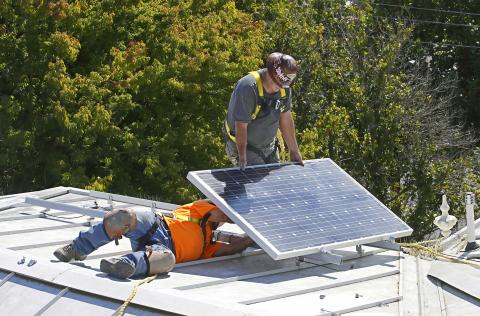Builders in California will be required to fit solar panels on most new homes from 2020 under new building standards adopted on Wednesday, a move that is the first in the United States and could provide a big boost to the solar industry.
The decision, adopted unanimously by the five-member California Energy Commission, is part of the state’s effort to fight global climate change. It came despite estimates it would raise the up-front cost of a new home by nearly US$10,000 in one of the most expensive parts of the country.
The Commission estimated the standards will add about US$40 to monthly mortgage payments but will compensate for that by saving residents US$80 a month on energy bills.

Photo: AP
照片:美聯社
“We cannot let Californians be in homes that are essentially the residential equivalent of gas guzzlers,” Commissioner David Hochschild said ahead of the vote.
The new building codes include updates to building ventilation and lighting standards. They are collectively expected to reduce the state’s greenhouse gas emissions by 700,000 metric tons over three years, a level equal to taking 115,000 cars off the road, according to state officials.
The vote was a major win for the solar installation industry, which already counts California as its biggest market. Demand for solar equipment in California could rise by 10 percent to 15 percent because of the new standards, the Energy Commission forecast in a study earlier this year.
California has one of the most ambitious renewable energy mandates in the country, with a goal of sourcing half of its electricity needs from renewable sources by 2030. At the end of 2017, it had reached about 30 percent, according to the CEC.
Because of such policies, the most populous US state has frequently been at odds with President Donald Trump’s aggressive rollback of policies to combat climate change. Governor Jerry Brown is planning a global climate summit this September.
Just 9 percent of single-family detached homes in the state of 39.5 million people currently have solar panels, according to a 2017 US Department of Energy report the Energy Commission cited.
Buildings that are shaded or have a roof that is too small to accommodate panels will be among those exempt, California Energy Commission spokeswoman Amber Pasricha Beck said.
(Reuters)
美國加州上週三通過新的建築標準,自二O二O年起,建築商必須在多數新建住宅安裝太陽能板。此舉創美國首例,並可能為太陽能業帶來巨大的推動力。
加州是美國最昂貴的地區之一,即便此規定估計會提高新房的前期成本近一萬美元,這項決策仍獲加州能源委員會五位委員一致通過,是加州因應全球氣候變化所做的另一努力。
據加州能源委員會估計,這項新標準將增加每月房貸約四十美元,但會被每月為住戶所節省的八十美元能源費所抵銷。
「我們不能讓加州人住在那些基本上等於住宅版耗油車的房子裡」,能源委員會主席大衛‧霍克希德在投票前說。
新的建築規範包括建築通風和照明標準的更新。加州官員表示,新的建築規範預計在三年內要將加州的溫室氣體排放量總共減少七十萬公噸,這相當於減少十一‧五萬輛汽車的排放量。
這次投票是太陽能安裝業的一大勝利,太陽能業已將加州視為最大市場。能源委員會在今年稍早的一項研究中預測,新標準可能會使加州對太陽能設備的需求提高百分之十至十五。
加州所進行的是美國最具雄心的再生能源計畫之一,目標是在二○三○年前,將該州一半的電力需求改由再生能源供應。據能源委員會統計,二○一七年底,加州的再生能源供電比例已達約百分之三十。
這樣的政策,使得加州這美國人口最多的一州,與政策急轉彎、撤回對抗氣候變化政策的川普總統常有扞格。加州州長傑瑞‧布朗計劃在今年九月舉行全球氣候峰會。
據能源委員會引述二○一七年美國能源部的報告指出,在有三千九百五十萬人口的加州,目前僅有百分之九的獨棟房屋住戶裝有太陽能電池板。
加州能源委員會發言人安珀‧貝克說,若建築物被陰影遮蔽,或屋頂太小,裝不下太陽能面板,則可以免受此規範限制。
(台北時報林俐凱編譯)

Noise pollution is a frequently underestimated environmental hazard. While hearing loss is the best-known outcome associated with noise, emerging research is uncovering how noise affects our health in other ways. From impaired memory and sleep disturbances to cardiovascular problems, the impact of noise is profound. For a start, unpleasant or excessively loud sounds can lead to stress and divert attention. Even everyday noises, such as those caused by traffic, lawnmowers, and construction work, can interfere with cognitive functions and elevate stress levels. “Our ears capture sound, but we hear with our brains,” explains Wei Sun, an audiology researcher at

A: Apart from singer Daniel Kang, more South Korean stars are coming to Taiwan in March. B: Really? Like who? A: Taeyeon of Girls’ Generation will hold a concert at the Taipei Dome on March 16. B: So she’ll set a milestone by becoming the first K-pop artist to stage a show at the venue. A: Singer Lee Mu-jin, boy group NCT 127 and girl group GFRIEND are also visiting Taiwan. I can’t wait. A: 除了姜丹尼爾,3月有不少韓星訪台。 B: 真的嗎?有誰啊? A: 像是少女時代的太妍,3月16日即將唱進大巨蛋。 B: 成為首位破蛋的韓流歌手,這可真是一項里程碑! A: 歌手李茂珍、男團NCT 127、女團GFRIEND 3月也要來,真是令人期待。 (By Eddy Chang, Taipei Times/台北時報張迪)

In the digital age, where communication revolves around text messages, “telephone phobia” (also known as “telephobia”) has become increasingly common, especially among young adults. Despite the ubiquity of smartphones, a significant number of individuals experience anxiety when __1__ making or receiving a phone call. Telephobia, in essence, is a fear or reluctance related to speaking on the phone. __2__ other communication methods, phone conversations require spontaneous responses and lack visual feedback such as body language and facial expressions. In such a real-time situation, telephobia sufferers are concerned about their inability to respond or express themselves appropriately, which can lead

A: My favorite K-pop superstar, Daniel Kang, will hold a concert at the Taipei Music Center. B: Wow, I’ve also been a fan since he debuted in 2017 as the “center” of the two-year limited boy group Wanna One. A: Since Daniel went solo in 2019, he has continued to shine internationally. B: When is his show taking place? A: It’s scheduled for March 1, which is my birthday. It’s the best birthday gift ever. A: 我最愛的韓星姜丹尼爾要在台北流行音樂中心開唱啦。 B: 哇,自他在2017年以2 年限定男團Wanna One「C位」出道時,我就 一直是他的粉絲。 A: 而他在2019 年單飛後,還是持續在國際上發光發熱。 B: 演唱會是哪天? A: 日期訂在3月1日,也是我的生日。這真是最好的生日禮物! (By Eddy Chang,